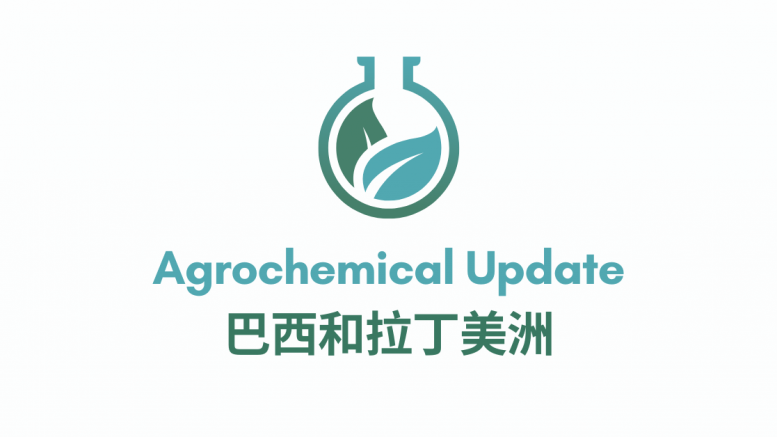Chlorpyrifos was banned in Peru
Brazil
Ministry of Agriculture approved 30 registrations of pesticides, four of which are for organic agriculture. (MAPA)
Russia’s withdrawal from the Black Sea grain deal should not impact sales of the Brazilian fertilizer market, according to the Agricultural Fertilizers and Correctives Industry Union in the State of Paraná. If any impact occurs, it will be only a negligible oscillation, according to the Union. StoneX consultancy company claims that there may be long-term impacts if grain prices increase. “There may be an increase in fertilizer demand for the summer crop, followed by higher values because of this demand”, according to the company. (Sindiadubos – PR; StoneX Consulting)
Cotton farmer in Sorriso, State of Mato Grosso, was fined US$ 46.73 thousand due to irregular use of fipronil, that caused the death of bees in the region. According to the Institute of Agricultural Defense of Mato Grosso, fipronil is extremely toxic to bees and is used to control pests in crops such as cotton, soybean, rice, potatoes, etc. (Indea)
In compliance with court decisions, Anvisa approves the toxicological evaluation of the pesticides technical chlorantraniliprole (Rainbow), picloram (Rainbow), and atrazine + mesotrione + S-metolachlor (Rainbow); bifenthrin + sulfoxaflor (Adama); glufosinate ammonium salt (Alta); glyphosate dimethylamine salt (Proregistros); and flumioxazin (CHDS). (Anvisa)
Fertilizers from Russia represented approximately 20% of the nearly 4 million tonnes that Ports of the State of Paraná received from January to May of 2023. (Ports of Paraná)
Farmers’ purchasing power index for fertilizers showed an improvement of 12% in June. This was the best value recorded in 2023. Fertilizer prices showed an average decrease of 14% compared to May 2023. In order to avoid logistical issues, farmers should purchase in advance, ensuring that sowing happens at the right time. (The Mosaic Company)
According to agronomist Paulo Vilella, business development manager at Perfect Flight, it is important that farmers be more careful during product application and spraying in the winter. Low temperatures provide a more stable atmosphere for spraying, but in the event of extreme conditions, such as temperatures below 10°C, the metabolism of plants slows down, requiring a better application period. According to Vilella, the absorption of products by plants may also be slower at very low temperatures. (Perfect Flight)
Research network with 32 Brazilian scientists concluded that multisite fungicides are more efficient for soybean Asian rust control. “The results are released annually by the network and have been used to help technicians and farmers in defining more efficient practices for the control of Asian rust, the most severe soybean disease”, according to Embrapa Soybean’s researcher Cláudia Godoy. (Embrapa Soybean)
Minister of Agriculture, Carlos Fávaro, said that the new legislation proposed by the Pesticide Bill No. 1459/2022 will be “approved and sanctioned” in 2023. The statement happened during a meeting of the Superior Council of Agribusiness of the Federation of Industries of the State of São Paulo. “We must remember farmers. We owe the Brazilian GDP to them”, said the minister. (Cosag; MAPA)

Latin America
Increase in international prices and rumors about new tariffs on the imports of goods and services worsened the terms of trade for fertilizers, harming farmers in Argentina. “In just 10 days, the international scenario and the possible change in local rules worsened the input/output ratio of grains and fertilizers from 10% to 15%”, according to Sofía Ganly, market analyst at AZ-Group. “The increase in the prices of fertilizers, combined with the drop in the value of grains for the harvest in Argentina, compared to the same date in 2022, determine that the input/output ratio will gradually deteriorate”, according to the AZ-Group analyst, Jeremias Battistoni. (AZ-Group)
In Peru, 28 companies continue selling chlorpyrifos even after Resolution No. 0032-2023 of the National Agricultural Health Service of Peru, that prohibited its use in the country. Companies have until August of 2024 to gradually withdraw products from circulation and stop their sales. According to Luis Gomero, president of the Peruvian Agroecological Consortium, the process of banning the molecule started 15 years ago. (Senasa; Peruvian Agroecological Consortium)
For Agustín Bilbao, director of the agriculture consulting Agroest
Yacimientos Petrolíferos Fiscales Bolivianos, the state owned oil company of Bolivia, earned US$ 46 million for the sale of 123.9 thousand tonnes of granulated urea during the 1H of 2023. “More than 33.41 thousand tonnes of fertilizers were delivered to the domestic market, and more than 90 thousand tonnes were shipped to Argentina, Brazil, Paraguay and Peru”, according to the president of YPFB, Armin Dorgathen. Brazil was the main destination, importing more than 82 thousand tonnes. (YPFB)

READ MORE:

